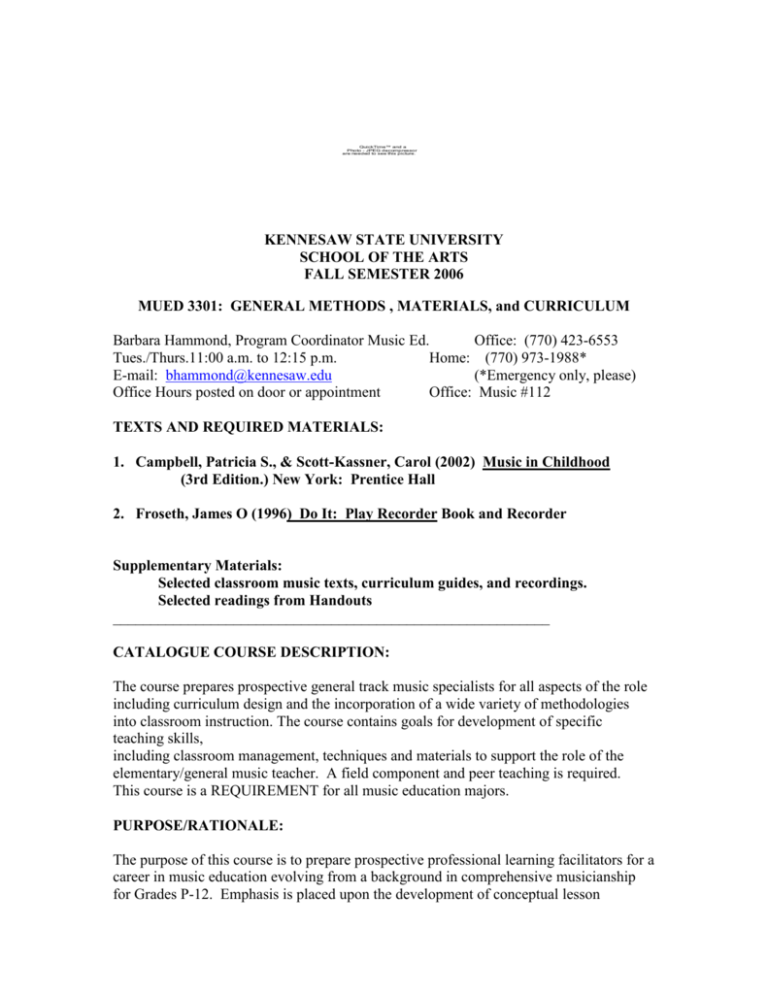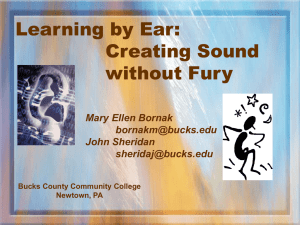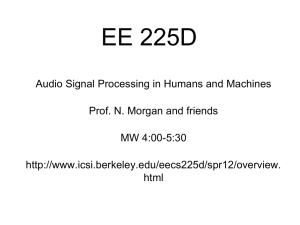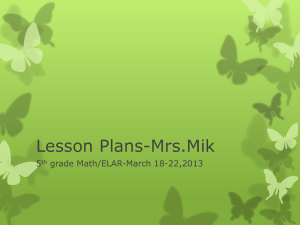MUED 3301 syllabus - Kennesaw State University
advertisement

QuickTime™ and a Photo - JPEG decompressor are needed to see this picture. KENNESAW STATE UNIVERSITY SCHOOL OF THE ARTS FALL SEMESTER 2006 MUED 3301: GENERAL METHODS , MATERIALS, and CURRICULUM Barbara Hammond, Program Coordinator Music Ed. Office: (770) 423-6553 Tues./Thurs.11:00 a.m. to 12:15 p.m. Home: (770) 973-1988* E-mail: bhammond@kennesaw.edu (*Emergency only, please) Office Hours posted on door or appointment Office: Music #112 TEXTS AND REQUIRED MATERIALS: 1. Campbell, Patricia S., & Scott-Kassner, Carol (2002) Music in Childhood (3rd Edition.) New York: Prentice Hall 2. Froseth, James O (1996) Do It: Play Recorder Book and Recorder Supplementary Materials: Selected classroom music texts, curriculum guides, and recordings. Selected readings from Handouts __________________________________________________________ CATALOGUE COURSE DESCRIPTION: The course prepares prospective general track music specialists for all aspects of the role including curriculum design and the incorporation of a wide variety of methodologies into classroom instruction. The course contains goals for development of specific teaching skills, including classroom management, techniques and materials to support the role of the elementary/general music teacher. A field component and peer teaching is required. This course is a REQUIREMENT for all music education majors. PURPOSE/RATIONALE: The purpose of this course is to prepare prospective professional learning facilitators for a career in music education evolving from a background in comprehensive musicianship for Grades P-12. Emphasis is placed upon the development of conceptual lesson implementation within a systematic methodological framework, which is outcome-based. A commitment is made toward developing and teaching conceptual music lessons and units, which are developmentally appropriate, and which foster critical and creative thinking and aesthetic awareness for all students within a broad multicultural knowledge base. CONCEPTUAL FRAMEWORK: (Collaborative Development of Expertise in Teaching and Learning) The Professional Teacher Education Unit (PTEU) at Kennesaw State University is committed to developing expertise among candidates in initial and advanced programs as teachers and leaders who possess the capability, intent and expertise to facilitate high levels of learning in all of their students through effective, research-based practices in classroom instruction, and who enhance the structures that support all learning. To that end, the PTEU fosters the development of candidates as they progress through stages of growth from novice to proficient to expert and leader. Within the PTEU conceptual framework, expertise is viewed as a process of continued development, not an end-state. To be effective, teachers and educational leaders must embrace the notion that teaching and learning are entwined and that only through the implementation of validated practices can all students construct meaning and reach high levels of learning. In that way, candidates are facilitators of the teaching and learning process. Finally, the PTEU recognizes, values and demonstrates collaborative practices across the college and university and extends collaboration to the community-at-large. Through this collaboration with professionals in the university, the public and private schools, parents and other professional partners, the PTEU meets the ultimate goal of assisting Georgia schools in bringing all students to high levels of learning. Prospective music educators in today's society are charged with providing a thorough and balanced curriculum for all students. In accordance with the Tanglewood Declaration (1967), music is an essential ingredient of the core educational process. Guidelines for concept formation and lesson implementation are consistent with the researched-based National Standards for Music Education, published in 1994 by Music Educators National Conference and the Standards delineated in the State of Georgia Quality Core Curriculum (QCC) or State Performance Standards. The content of the course is well grounded in eclectic classroom-tested methodologies for developing music skills and for bringing meaningful musical experiences for students. Pedagogical techniques utilized in the development of musical understanding and skills are based upon sequential designs for gaining musical literacy and student independence. Philosophical foundations are derived from theory relating to multi-sensory learning and a balance between the domains of learning. Classroom management skills are infused in the curricular content and assessed within the field experiences. TECHNOLOGY: Students in MUED 3301 are required to incorporate technology into model lessons. At least one assignment must include an internet search, presentation technology such as Power Point, or appropriate computer-generated teaching materials, and/or specific music softwear. During the semester, students will have an opportunity to observe a classroom using computer-based keyboard instruction. Students will be expected to utilize the Ga. Learning Connections’ website for lesson planning: www.glc.k12.ga.us. In addition, other sites and sources will be available as resource. DIVERSITY: A variety of materials and instructional strategies will be employed to meet the needs of the different learning styles of diverse learners in class. Candidates will gain knowledge as well as an understanding of differentiated strategies and curricula for providing effective instruction and assessment within multicultural classrooms. One element of course work is raising candidate awareness of critical multicultural issues. A second element is to cause candidates to explore how multiple attributes of multicultural populations influence decisions in employing specific methods and materials for every student. Among these attributes are ethnicity, race, socioeconomic status, gender, giftedness, disability, language, religion, family structure, sexual orientation, and geographic region. An emphasis on cognitive style differences provides a background for the consideration of cultural context. Kennesaw State University provides program accessibility and accommodations for persons defined as disabled under Section 504 of the Rehabilitation Act of 1973 or the Americans with Disabilities Act of 1990. A number of services are available to support students with disabilities within their academic program. In order to make arrangements for special services, students must visit the Office of Disabled Student Support Services (770-423- 6443) and develop an individual assistance plan. In some cases, certification of disability is required. Please be aware that there are other support/mentor groups on the campus of Kennesaw State University that address each of the multicultural variables outlined above. For more information contact the Student Life Center at 770-423-6280. The content and knowledge base of MUED 3301 emphasizes cultural diversity by drawing upon musical examples from around the world. Students are encouraged to prepare and present songs, movement, and listening lessons reflective of a wide variety of cultures and stylistic periods. COURSE GOALS/OBJECTIVES: The Professional Learning Facilitator in Music will be able: 1. to establish a rationale for General Music as an integral component in the elementary and middle school curriculum. (Conceptual Framework: Knowledge of content and pedagogy; expertise in facilitating student learning; National Standards in Music Education, # 8—see Appendix.) 2. to derive classroom music lessons from a diverse multi-cultural body of musical literature incorporating M.E.N.C. National Standards, QCCs and the methodological philosophies of Orff, Kodaly, Suzuki, Dalcroze, Gordon, Froseth, and Boardman. (CF: Knowledge of content and pedagogy; National Standards #1-9.) 3. to plan for conceptual, sequential, and appropriate musical experiences with an emphasis on lifelong music education and comprehensive musicianship. (CF: Knowledge of Content and pedagogy; expertise in facilitating student learning; National Standards: # 1-9.) 4. to plan for instruction (setting goals, objectives, set, pacing, procedures, materials and evaluative procedures) using an accepted lesson plan format, utilizing theories of learning styles, domains, and modes of learning. (CF: Expertise in facilitating student learning; expertise in assessing student learning.) 5. to utilize and manage materials and technological hardwear and softwear within a learning environment consistent with the intended objectives. (CF: Knowledge of content and pedagogy; expertise in facilitating student learning; expertise in assessing student learning: National Standards # 5, 7, 8.) 6. to develop strategies for teaching that employ a variety of methods and appropriate to the needs of all students including mainstreamed special students, and to utilize approved classroom management techniques. (CF: Knowledge of content and pedagogy, expertise in facilitating student learning; expertise in assessing student learning.) 7. to demonstrate facility in lesson implementation within the context of specific field experience assignments. (CF: Knowledge of content and pedagogy, expertise in facilitating student learning; National Standards # 1-9) 8. to develop an appropriate skill level on the Recorder, and also on the autoharp/guitar. (CF: Knowledge of Content; National Standards #2.) COURSE REQUIREMENTS: Successful completion of: 1. Weekly reading assignments and discussion participation. (Objectives # 1-7) 2. Choice of one outside Orff Observation or Workshop (from list of two—see separate description.) Summary/Critique to be turned in the week following the workshop/observation. (Obj. # 1, 2, 3, 6, 8) 3. General Music Text Book Review (form/guidelines provided.) (Obj. # 1-7) 4. Three lesson observations of general music classes (form provided.) Two group observations: (Kennesaw Primary and Pitner Elementary during class) and one additional Elementary, Preschool, or Middle. (Obj. # 1, 2, 3, 4, 6, 7) 5. Two lesson designs, each to be implemented to the Methods Class as a model, then taught to students at Pitner Elementary and Kennesaw Primary. These lessons will involve technology, visual aids, and a variety of teaching strategies. The lessons will require a self, peer, and teacher evaluation. (B. Hammond must be present for at least one lesson.) (Obj. # 1-8) 7. Written/oral report on a methodological philosophy (guidelines provided.) (Obj. # 1, 2, 6) 8. Recorder skill: Performance of a piece with at least six different notes, played smoothly and musically. (Obj. # 1, 8) 9. Autoharp/Guitar skill: Performance of a piece with at least three chords transposed into one other key. Performance will include playing and leading the class in song. (Obj. # 1, 8) 10. One Unit of Study (three to five lessons), expanding into a Unit, one previous lesson from those taught, emphasizing Scope/Sequence and Interdisciplinary Learning. (Obj. 1-6) 11. Final exam. (Obj. # 1, 2, 3, 4, 6) EVALUATION AND GRADING: (1000 Maximum Points) Outside Orff Obs./Workshop, etc. Text Review 100 (Obj. # 1, 2, 3, 6, 8) 50 (Obj. # 1-7) Observation Summaries (3 @ 50) 150 (Obj. # 1, 2, 3, 4, 6, 7) Written Lesson Plans (2 @ 50) 100 (Obj. # 1-8) Model Lesson Presentations in class (2 @ 25) 50 (Obj. # 1-8) Kennesaw Primary/Pitner Elementary Lessons (2 @ 100) 200 (Obj. # 1-8) (Including all Evaluations) Methodology Presentation 50 (Obj. # 1, 2, 6) Recorder, Autoharp/Guitar (50 Each) (Presented during semester--student’s choice date, or last day of class) 100 (Obj. # 1, 8) Unit of Study/Rationale 100 (Obj. # 1-6) Final Exam 100 (Obj. # 1, 2, 3, 4, 6) ___ Maximum Total 1000 Points (All late assignments will have a 5 point deduction) GRADING 900 -- 1000 800 -- 899 700 -- 799 600 -- 699 Below 600 = A B C D F ACADEMIC INTEGRITY: Every KSU student is responsible for upholding the provisions of the Student Code of Conduct, as published in the Undergraduate and Graduate Catalogs. Section II of the Student Code of Conduct addresses the University's policy on academic honesty, including provisions regarding plagiarism and cheating, unauthorized access to University materials, misrepresentation/falsification of University records of academic work, malicious removal, retention, or destruction of library materials, malicious/intentional misuse of computer facilities an/or services, and misuse of student identification cards. Incidents of alleged academic misconduct will be handled through the established procedures of the University Judiciary Program, which includes either an "informal" resolution by a faculty member, resulting in a grade adjustment, or a formal hearing procedure, which may subject a student to the Code of Conduct's minimum one semester suspension requirement. ATTENDANCE POLICY: The nature of this course is active and experiential. Learning takes place by "doing" and interacting with others. It is understood that each student will be present for the entire semester. Each absence after the first two (in case of illness) will result in a deduction of 25 points. Please discuss serious illness or emergency situations with instructor. APPENDIX: National Standards for Music Education (Music Educator’s National Conference) 1. Singing alone and with others, a varied repertoire of music. 2. Performing on instruments, alone and with others, a varied repertoire of music. 3. Improvising melodies, variations, and accompaniments. 4. Composing and arranging music within specified guidelines. 5. Reading and notating music. 6. Listening to, analyzing, and describing music. 7. Evaluating music and music performances. 8. Understanding relationships between music, the other arts, and disciplines outside the arts. 9. Understanding music in relation to history and culture. Georgia Performance Standards/QCCs: Consult Georgia Learning Connections website www.glc.k12.ga.us KENNESAW STATE UNIVERSITY MUED 3301 CALENDAR AND COURSE OUTLINE: Fall Semester, 2006 Barbara P. Hammond, Program Coordinator Music Education Office: Music #112, (770) 423-6553 Home: (770) 973-1988* *Emergency only, please E-mail: bhammond@kennesaw.edu Ongoing Topics: Conceptual Learning in General Music Curriculum Design in Music Methods, Material, and Strategies in General Music Musical Literacy in General Music Classroom Management in the Music Class MENC National Standards, State Standards Music Education in the Core Curriculum Recorder, Autoharp/Guitar Technology /Diversity in Music Ed Praxis II Preparation Comprehensive Musicianship Lifelong Learning in Music TUESDAY THURSDAY August 22 Introduction What is General Music? A Philosophy of Music Ed. Course Outline, Calendar August 24 The Power of Music Why? How? What is the Role of Music Ed? Readings for 8/29: Music in Childhood (MIC) 3rd Ed. Preface and Chap. 1 August 29 Overview of Music Learning Opportunities to Learn, Diversity Staffing, Equipment, Etc. Opportunities to Learn (Handouts) Music in Childhood For 8/31 Chap. 2 August 31 Musical Body of Knowledge (Scope and Sequence) Overview of Musical Elements National Standards in Music Ed. Georgia Perf. Stand./QCC’s For 9/5 MIC Chap. 7 September 5 The Element of Rhythm Concepts, Methods For 9/7 MIC Chap. 8 September 7 The Element of Tone Color Concepts, Methods For 9/12 MIC Chap. 4 & 5 September 12 The Element of Melody Teaching a Song—Strategies For 9/14 MIC Chap. 10 September 14 The Element of Harmony The Uncertain Singer Teacher Guide Review Due September 19 September 21 *Group Observation I: Kennesaw Prim. Lesson Planning, Curriculum Leave 10:45 return 12:30 Classroom Management For 9/21 MIC Chap. 11, 12, 13 September 26 Model Lesson I Presentations Lesson Plans Due (Rhythm, Tone Color, Melody/Harmony) September 28 Focus on Skills (Continue Model Lessons) For 10/3 MIC Chap. 6 (*Teaching at Kennesaw Primary: 10/2-- 10/6) October 3 Element of Form Listening Lessons, Strategies & Materials For 10/5 MIC Chap. 9 October 5 Form continued For 10/10 MIC Chap. 3 (Portion on Kodaly) October 10 **Guest Presenter Dr. Kathy Creasy Kodaly --Methods & Materials October 12 Class Discussion Teaching Evaluations Due For 10/19 MIC Chap. 14 October 17 No Class—BH at Music Ed Conf. October 19 Form/Lesson Preparation Movement in General Music October 24 **Group Observation II: Pitner Elem. Leave 10:45 return 12:30 For 10/26 MIC Chap. 3 October 26 Methodology Overview October 31 Model Lesson II Presentation Form, Listening Lessons Lesson Plans due November 2 Model Lesson, continued Skills For 11/7 MIC Chap. 15/16 **(Teaching Week: Pitner Elementary Nov. 6-10) November 7 Students with special needs November 9 Recorder/Skills For 11/14 MIC Chap. 17 November 14 Group Discussion Evaluations due Unit Overview November 16 Methodology Presentations November 21 Methodology Presentations Continued November 23 Thanksgiving, No Class November 28 Performing Groups in Gen Music Centers of Learning Unit Development Help Preparation for Final Exam November 30 Final Exam December 5 Unit Presentations All Written Units due Final Exam Discussion Recorder, Auto Harp Performance December 7 (Exam Day) Unit Presentations--Continued Recorder, Auto Harp Performance (Continued) Closure






